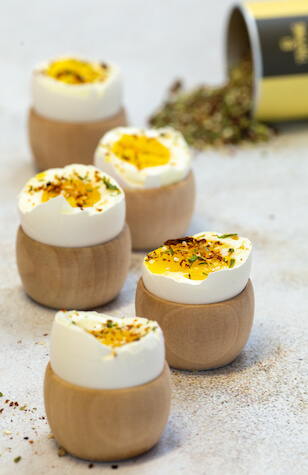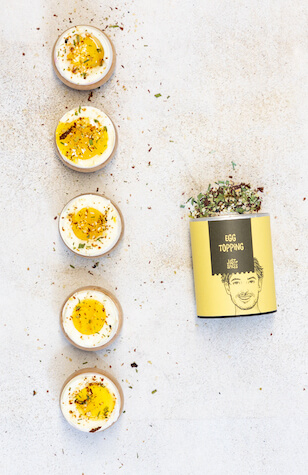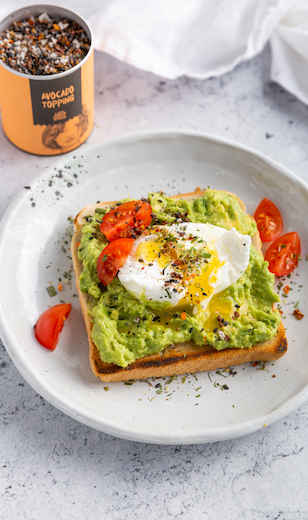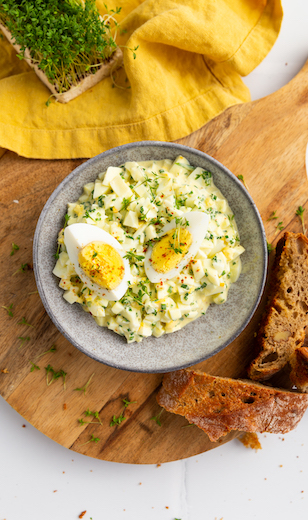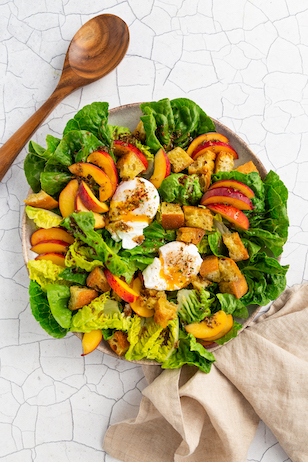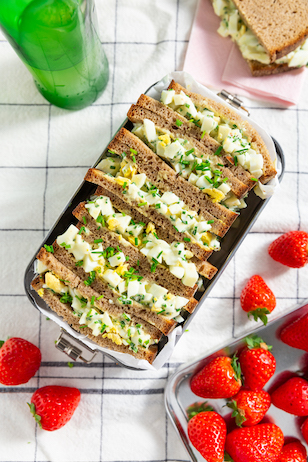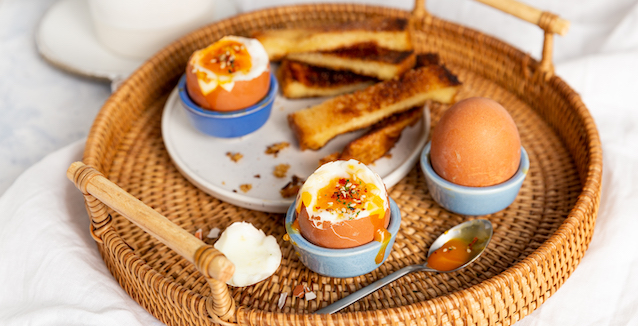
Cooking Basics
How to boil an egg
February 16, 2022
So, where do we begin? Boiling an egg sounds so straightforward, doesn’t it? Just bring the water to a boil and drop it in for ... um ... how long? Aside from the time it takes to boil the perfect egg, there’s a whole lot more to consider – but it’s not difficult once you have the basic rules down! Read on to discover everything you need to know about how to making boiled eggs!
Table of contents
The perfect boiled egg
Boiled eggs are a delicious addition to any breakfast or a quick dinner in many households. But the question often comes up: how long does it take to boil the perfect egg?
We’ve tackled this topic in depth – you won’t believe how many eggs our editors have gone through this week – and are ready to declare the ideal cooking times for both soft- and hard-boiled eggs. We’ll also teach you a quick way of checking if your eggs are still fresh. Furthermore, we’ll clear up common myths about chicken eggs, introduce you to some of the tastiest egg recipes, and provide you with plenty of information, tips and tricks on how to boil an egg perfectly.
How long to boil the perfect egg?
Determining how long to boil your egg isn’t always a one-size-fits-all answer – it really boils down to personal taste. Do you prefer your eggs hard, jammy or very soft? Depending on whether you want your egg soft, medium or hard, the cooking time would usually range from about 5 to 11 minutes. The longer the egg cooks, the firmer both the white and the yolk will be. Here are our favourite timings:
How long for soft-boiled eggs?
5 minutes for soft-boiled eggs with dippy soldiers
How long for jammy eggs?
7 minutes for jammy eggs
How long for hard-boiled eggs?
11 minutes for hard-boiled eggs
Tip: For accurate timing, place the egg into water that is already simmering, not before. This method helps you keep precise track of the cooking time, ensuring the egg doesn’t start cooking before the water reaches the right temperature.
We’ve put together a visual guide to see the different consistencies of both the egg yolk and the egg white.
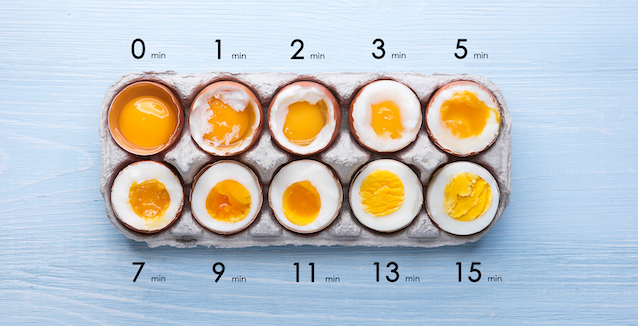

Best spice blends for eggs
Understanding egg sizes: UK vs US
Navigating the egg aisle can be a little confusing if the eggs are all different sizes. In the UK, these are the standard egg sizes you'll find, categorised by weight:
- Egg size S: up to 53 g
- Egg size M: 53–63 g
- Egg size L: 63–73 g
Over in the US, things scale from peewee (!) right up to jumbo. What the UK considers medium (53 to 63 grams), the US calls large. This subtle difference is vital in baking, where the wrong size egg can throw off your cakes and bakes completely. So if an American recipe calls for a large egg, remember to use medium!
The size of your egg affects how long you need to boil them. The timings we’ve given are for medium eggs in the UK. Smaller eggs, for instance, cook a tad quicker, as you might imagine. You should reduce your usual boiling time by 20 to 45 seconds if you’re got small eggs.
On the flip side, larger eggs need a bit more time in the pot. To nail that perfect yolk consistency, whether soft or hard, consider extending the cooking time by 25 to 50 seconds.
Here’s a handy tip: always let your eggs come to room temperature before dropping them in boiling water. If they go in straight from the fridge, you might need to add about 60 seconds to the cooking time. Yes, when it comes to boiling eggs, timing really is everything!
Boiling eggs: Alternative methods
Now you know how long it takes to boil the perfect egg in a pot. But did you know that there are many more ways to boil eggs? Let’s look at some alternatives.
Probably the most relaxed and easiest way to cook eggs. Due to practical features such as a timer setting and warming function, boiling eggs in an egg cooker is a piece of cake. It doesn’t matter whether you’re after a soft-boiled egg with a runny yolk or a hard-boiled egg for salads – this piece of kit takes all the guesswork away.
This might seem like a faff, but at least you can set it and forget it. Put your eggs into your slow cooker. Cover with cold water so the eggs are completely submerged. Turn the slow cooker onto high and cook for 2.5 to 3 hours.
Have you ever boiled an egg in the kettle? Sounds weird, but it is possible. The only constraint is that there mustn’t be any visible heating rods inside the kettle. Put your eggs in, fill with water until the eggs are completely submerged, then boil the kettle. For a soft-boiled egg, leave the egg in the kettle after it has boiled for another 5 minutes. A hard-boiled egg needs 8–10 minutes. The dangerous part is removing the cooked eggs from the hot kettle at the end – so pour out the water carefully and protect your hands. Please use caution if you want to try this!
Does it work? Admittedly, we were a bit surprised ourselves, but it works. Boil some water in a kettle beforehand. Then place the water and eggs in a microwave-safe bowl. Tip: add a pinch of salt to the cooking water to keep the eggs from cracking. If the water is preboiled, hard-boiled eggs should take 10–12 minutes in the microwave. Be careful when removing the container from the microwave, as it will be very hot and you could easily burn yourself or children/pets.
We much prefer to use the normal methods of boiling eggs – in a saucepan on the stove or in an egg cooker or slow cooker. We do not recommend trying the kettle or microwave methods!
Pricking the eggs
It’s a common belief that pricking eggs on one side before boiling will prevent them from bursting open. But is this really effective? The reason eggs crack during boiling is often debated. One theory suggests that the small air bubble inside the egg expands from the heat, causing the shell to burst. Another more likely explanation is that the delicate eggshell simply cannot withstand the sudden temperature change, leading to cracks.
Interestingly, a large-scale experiment involving several thousand eggs – half pricked and half not – showed no significant difference in the number of eggs that burst during cooking. About 10% of eggs crack regardless of whether they are pricked. Personally, we had more success with pricking the eggs, as long as the eggs were at room temperature.
Tip: If an egg does crack while cooking, try adding a bit of white vinegar to the water. This helps the escaping protein coagulate quicker, containing the mess and salvaging your egg.
How to peel boiled eggs properly
Once the eggs are boiled, you’re nearly there. But sometimes, peeling them can turn into a hassle if the shell clings stubbornly to the egg. What’s the reason behind this peeling predicament? Why are some eggs harder to peel than others? While there’s a whole lot of complicated chemistry involved, the primary factor is usually the egg’s freshness. Fresher eggs tend to have a tighter bond between the shell and the membrane, making them harder to peel. As eggs age, this membrane loosens, making the peeling process smoother.
And about that old wives’ tale of shocking eggs in cold water to make them easier to peel? It’s time to debunk that myth. Shocking them does help in stopping the cooking process immediately, ensuring your eggs don’t overcook, but it doesn’t necessarily make them easier to peel. So, focus more on using slightly older eggs if you want to avoid the peeling struggle!
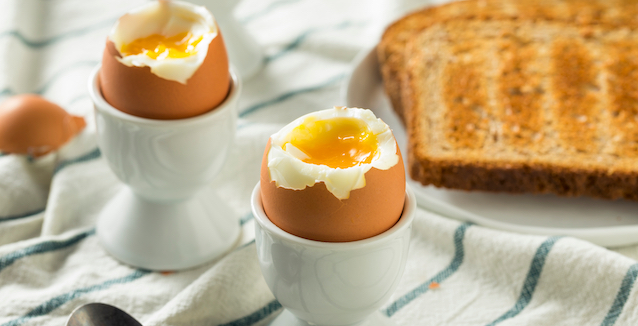

How to store raw eggs: In the fridge or on the countertop?
In UK supermarkets, eggs are typically displayed at room temperature. This might lead you to wonder if it’s necessary to refrigerate them once you get home. Despite their unchilled presentation in stores, it is advisable to refrigerate eggs after you bring them home. The reason supermarkets can keep eggs unrefrigerated is due to the UK’s egg handling practices, where eggs are not washed, thus retaining their natural protective barrier. (This differs to the way eggs are handled and stored in the States.)
Refrigerating eggs at home helps maintain a stable temperature and prolongs their freshness. Remember, eggs can remain fresh for at least 28 days from the date they were laid. Always check the best-before date to ensure quality and safety. This simple step can make a big difference in keeping your eggs fresh for longer.
How can I tell if eggs are still good?
Even if you’ve thrown away the carton and can’t check the best-before date, there’s a simple and effective way to test whether your eggs are still okay to use. This method is known as the floating test. Here’s how you do it:
Grab a glass of water and the egg you want to test. Gently place the egg into the water. Now, it’s time to observe:
If the egg sinks to the bottom and stays there, it’s a good sign! Your egg is fresh and safe to eat.
Using this test, you can quickly determine the freshness of an egg and decide whether it’s suitable for cooking. This tip ensures you use only the best eggs for your meals, keeping your dishes delicious and safe.
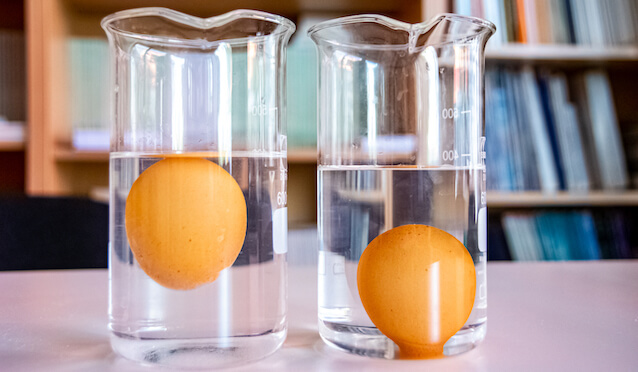

The nutritional breakdown of an egg
When you boil an egg, you’re cooking up a powerhouse of nutrients. Firstly, eggs are an excellent source of high-quality protein, which the body can use almost completely. In terms of fat content, it's interesting to note that while the yolk contains fats, the egg white is almost entirely fat-free.
Eggs are also packed with several important vitamins. Notably, they provide vitamin A and several B vitamins, essential for various bodily functions. However, a common concern is about cholesterol in eggs, particularly found in the yolk. Although it’s true that egg yolks contain cholesterol, recent research suggests that the cholesterol in eggs has little effect on the overall cholesterol levels in most people. As a result, based on the current understanding, there’s no recommended limit to egg consumption for healthy individuals. (But please check with your doctor if you are looking to control your cholesterol levels.)
This makes eggs a valuable addition to your diet, not only for their versatility but also for their nutrient-rich profile, supporting everything from vision to energy levels.
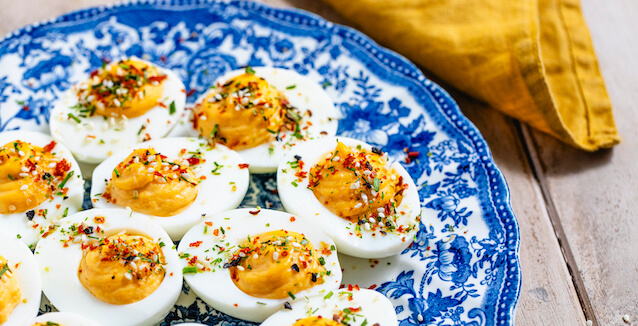

What does the Lion stamp on eggs mean?
When you pick up a carton of eggs, you’ll notice each egg is stamped with a code that tells you more about its origin and how the hens were raised. This code is part of a wider EU standard but continues to be used post-Brexit in the UK. The first digit of this code indicates the farming method used:
0 – Organic: Hens have access to the outdoors and are fed an organic diet.
1 – Free-range: Hens have daytime access to outdoor spaces.
2 – Barn: Hens are kept indoors with the freedom to roam within the barn.
3 – Caged: Hens are kept in cages with regulated dimensions.
Additionally, you may see the British Lion mark, which is a symbol of quality assurance. Eggs stamped with the British Lion have met stringent safety standards, including vaccinations against salmonella and comprehensive traceability from hen to store. This mark ensures that the eggs are not only produced under good welfare conditions but are also among the safest and highest quality available.
These markings help you make informed choices about the eggs you consume, based on both animal welfare and food safety standards.
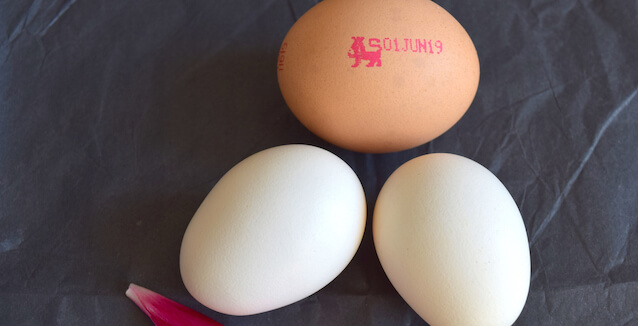

- 0 = organic production
- 1 = free range
- 2 = floor husbandry
- 3 = enriched caging
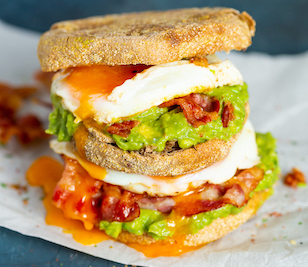

Why are some eggs white and others brown?
Ever wondered why eggs come in different colours? If a curious youngster ever throws this question your way, here’s a simple and accurate way to explain it. The colour of an eggshell is determined not by the colour of the hen’s feathers, but rather by the genetics of the hen. Specifically, you can tell the colour of the eggs a hen will lay by looking at the color of the skin or feathers located in the area around the hen’s earlobes.
White earlobes: Hens with white earlobes typically lay white eggs.
Red earlobes: Hens with red earlobes generally lay brown eggs.
This colour trait is genetically coded and does not affect the quality or taste of the egg; it’s all about appearance. So, whether an egg is white or brown, the nutritional content remains the same. It’s a fun piece of trivia that can make understanding chicken breeds and their eggs a bit more interesting!
Colouring boiled eggs for Easter
Colouring eggs for Easter is a delightful way to add a touch of whimsy to Easter celebrations. Whether it’s for breakfast, brunch or just a change from all the chocolate, not only are these Easter eggs a treat to eat, but they also look beautiful on the table. Here’s how you can easily create coloured eggs using natural ingredients:
Red eggs: Beetroot is great for achieving a beautiful red hue. Simply peel and cut the beetroot into small cubes, then simmer in water for about 30 minutes. Harb-boil your eggs, then place them still warm in the red liquid for at least 30 minutes to soak up the vibrant colour.
Blue eggs: For a lovely blue, try using blueberries. Boil them in some water for 30 minutes, then drain. Place the hard-boiled eggs in the berry juice. The more berries you use, the more intense the blue colour will be.
Yellow eggs: To get a bright yellow colour, a solution made from turmeric or saffron in water is ideal. However, be cautious with turmeric as it can stain everything it touches. Prepare it carefully and soak the eggs as before for vivid results.
Green eggs: For green, spinach works perfectly. Boil the spinach in water and then submerge the hard-boiled eggs in the juice for at least 30 minutes.
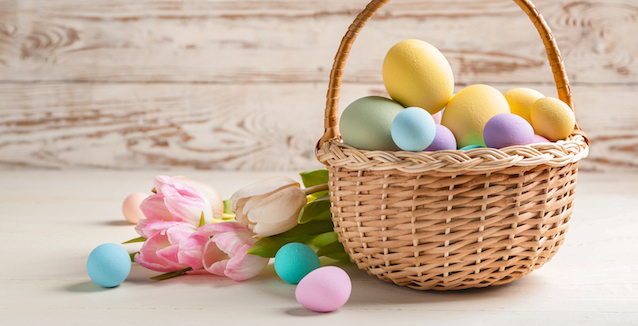

To make sure your hard-boiled eggs soak up those vibrant hues perfectly, give them a quick wash in vinegar water, followed by a rinse under cold water, before leaving them to soak in the brightly coloured mixtures. These natural methods are not only fun but also a safer and eco-friendly alternative to artificial dyes, making your Easter celebration colourful and creative.
More egg recipes
Nothing prepares you better for the day than a hearty breakfast, and no morning meal is complete without a tasty egg dish. Check out our breakfast recipe collection for lots of inspiring breakfast ideas. We’ve gathered some of our favourite breakfast recipes just for you, including plenty of ways to enjoy eggs. Whether you’re after something quick and easy or want to experiment with new flavours, you’ll find plenty to get your day off to a great start.




